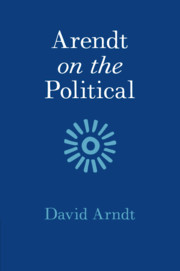Book contents
- Arendt on the Political
- Arendt on the Political
- Copyright page
- Contents
- Preface
- Acknowledgments
- Abbreviations
- Introduction
- Chapter 1 On Arendt
- Chapter 2 A Way of Thought
- Chapter 3 A Pure Concept of the Political
- Chapter 4 Thinking before Theory
- Chapter 5 Classical Political Philosophy
- Chapter 6 Rethinking the Classical Legacy
- Chapter 7 On Politics and Revolution
- Conclusion: The Political Today
- Works Cited
- Index
Chapter 5 - Classical Political Philosophy
Published online by Cambridge University Press: 15 October 2019
- Arendt on the Political
- Arendt on the Political
- Copyright page
- Contents
- Preface
- Acknowledgments
- Abbreviations
- Introduction
- Chapter 1 On Arendt
- Chapter 2 A Way of Thought
- Chapter 3 A Pure Concept of the Political
- Chapter 4 Thinking before Theory
- Chapter 5 Classical Political Philosophy
- Chapter 6 Rethinking the Classical Legacy
- Chapter 7 On Politics and Revolution
- Conclusion: The Political Today
- Works Cited
- Index
Summary
The fifth chapter lays out Arendt’s critical dismantling of classical political philosophy. Socrates understood the dialogical and aporetic nature of essential thought, she argued, and Socratic thought is compatible with the openness and endlessness of political persuasion.By contrast, Plato aimed to replace political persuasion with government by philosopher-kings, whose knowledge entitled them to rule over citizens, as the expertise of master craftsmen entitled them to give orders to subordinates.But this aim led Plato both to misunderstand the realities of political life and to misconceive the nature of political theory.Aristotle also derived some of his basic terms from the sphere of production, Arendt argued, so that his metaphysical concepts led him to conceive the political philosopher on the model of a craftsman, the polis on the model of a product, and political action on the model of making. The chapter then traces Arendt’s genealogies of the concepts of freedom, authority, law, and principle in classical philosophy. This account of classical political theory leads to the question of the next chapter: How did Arendt rethink the basic realities of politics?
- Type
- Chapter
- Information
- Arendt on the Political , pp. 108 - 165Publisher: Cambridge University PressPrint publication year: 2019

